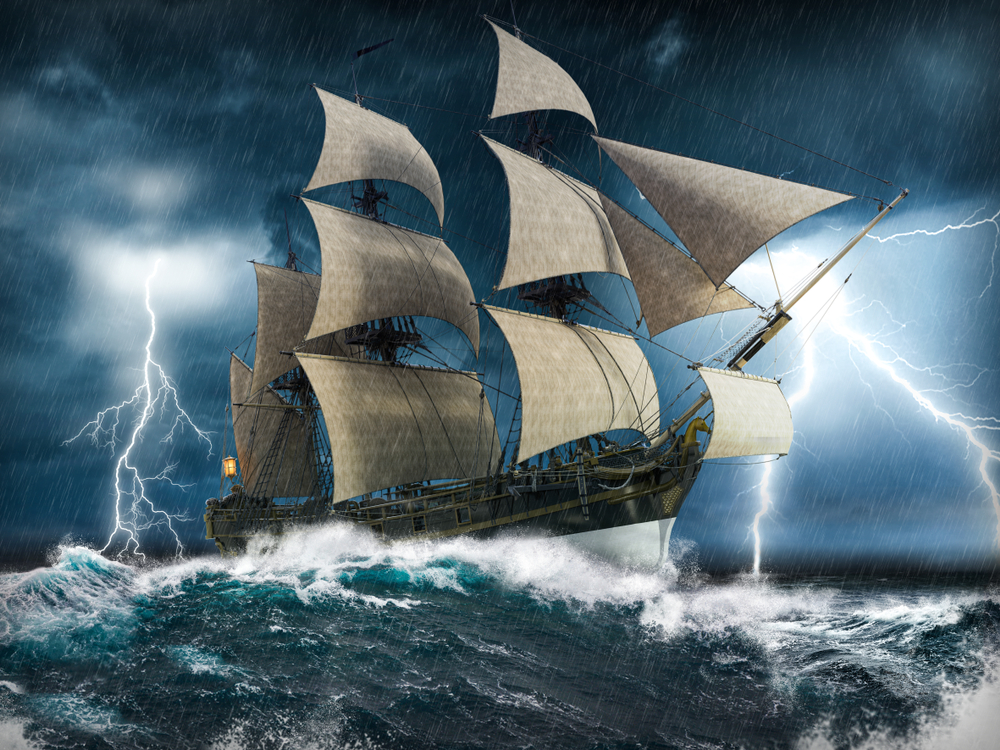
But the LORD sent out a great wind into the sea, and there was a mighty tempest in the sea, so that the ship was like to be broken. (Jonah 1:4)
Jonah took a ship to flee to Tarshish and from his assigned mission. Yet, our omnipotent God would have His way in Jonah’s life. To prove this fact, God sent a terrible storm upon the sea. While storms were and are common in the Mediterranean, this storm was not a coincidence.
Jonah had disobeyed God’s directive. God would get Jonah’s attention by any means necessary. This storm was so great that even the experienced sailors onboard the ship were afraid:
Then the mariners were afraid, and cried every man unto his god, and cast forth the wares that were in the ship into the sea, to lighten it of them. (1:5a)
The sailors began to do everything they to ensure the safety of the vessel. They cried to their gods for help, and when that didn’t work, they became so desperate that they surrendered their livelihood.
Remember, these were merchant sailors; they depended on the money they would receive for selling their goods. Now, they were so afraid of the storm and of losing their lives that they no longer cared about their cargo. This gives us an excellent idea of their mental states during this situation.
But where was Jonah?
But Jonah was gone down into the sides of the ship; and he lay, and was fast asleep. (1:5b)
Picture it: The sailors were in fear for their lives, and Jonah is sleeping! It’s hard to believe that anyone could sleep during such a terrible storm, but Jonah, apparently, could.
This shows the depths of Jonah’s apathy toward disobeying God. How else could he feel so relaxed in his rebellion that he could so easily fall into such a deep sleep?
So the shipmaster came to him, and said unto him, What meanest thou, O sleeper? arise, call upon thy God, if so be that God will think upon us, that we perish not. (1:6)
Even the captain of the ship was shocked that Jonah slept. We can easily picture his shocked and angry face as he shook Jonah awake. His tone certainly comes across as accusatory.
The captain was feeling desperate as well. He saw that lightening the ship and calling on their gods was accomplishing nothing. He begged Jonah to get up, come up on deck, and call on his God to save them.
And they said every one to his fellow, Come, and let us cast lots, that we may know for whose cause this evil is upon us. (1:7a)
As the situation worsened, the sailors started to believe that the storm was a result of divine anger at someone onboard. So, they decided to cast lots to try to determine whose fault it was.
Casting lots was a process by which people would throw special stones to get a decision. In ancient times, people widely practiced lot casting because they thought the result reflected the divine will of their gods. Even the Israelites were known to use this practice to make decisions.
Throughout the Old Testament, we see the Israelites cast lots in a variety of circumstances: To divide the land (Numbers 26:55-56), to determine who would go first into battle (Judges 20:9), to determine the order of the priests and their duties (1 Chronicles 24:5-19; Nehemiah 10:34), and for many other reasons.
So they cast lots, and the lot fell upon Jonah. Then said they unto him, Tell us, we pray thee, for whose cause this evil is upon us; What is thine occupation? and whence comest thou? what is thy country? and of what people art thou? (1:7b-8)
Since the casting of lots showed that Jonah was the reason for the storm, suddenly everyone was looking at him. The sailors demanded more information from Jonah. They wanted to know who he was, what he did for a living, and where he lived. They wanted an explanation from Jonah as to why this storm had come upon them.
And he said unto them, I am an Hebrew; and I fear the LORD, the God of heaven, which hath made the sea and the dry land. (1:9)
Jonah’s response spoke volumes. He not only identified himself, but he also identified his Lord and his relationship with Him. Jonah made sure they knew that his God was THE GOD. He specifically mentioned that God made the sea and dry land; this conveyed to the sailors the idea that God is the Creator of everything.
Then were the men exceedingly afraid, and said unto him, Why hast thou done this? For the men knew that he fled from the presence of the LORD, because he had told them. (1:10)
It is clear from their response that the sailors understood the implications of Jonah’s answer to their demands. They were horrified at Jonah. They understood right away that they were caught in the middle of a dispute between Jonah and God. Jonah admitted to them that he was running from the Lord. This horrific storm was his fault.
